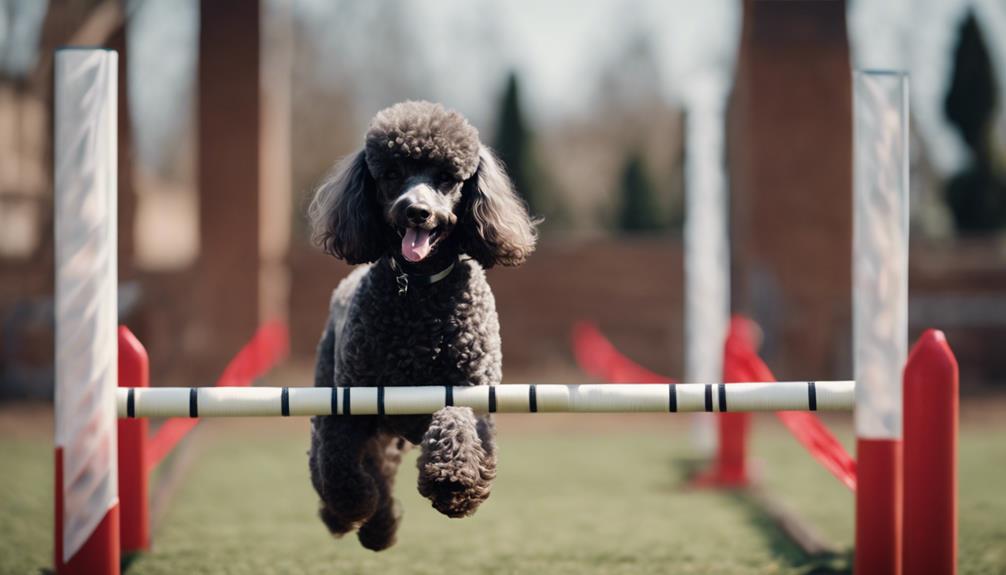Are you looking to elevate your Poodle's training to the next level? Gain insights into specialized techniques that can tap into your Poodle's intellect and energy. Discover how advanced training methods can unlock new potentials in your furry companion, taking their skills beyond the basics. Explore the possibilities of harnessing their intelligence and agility in ways that will keep both you and your Poodle engaged and fulfilled.
Key Takeaways
- Consistent practice enhances speed and agility in Poodles.
- Advanced trick training boosts mental sharpness and problem-solving abilities.
- Tailored fitness regimen improves overall well-being.
- Seek professional guidance for complex behavior issues for effective resolution.
Understanding Poodle Behavior
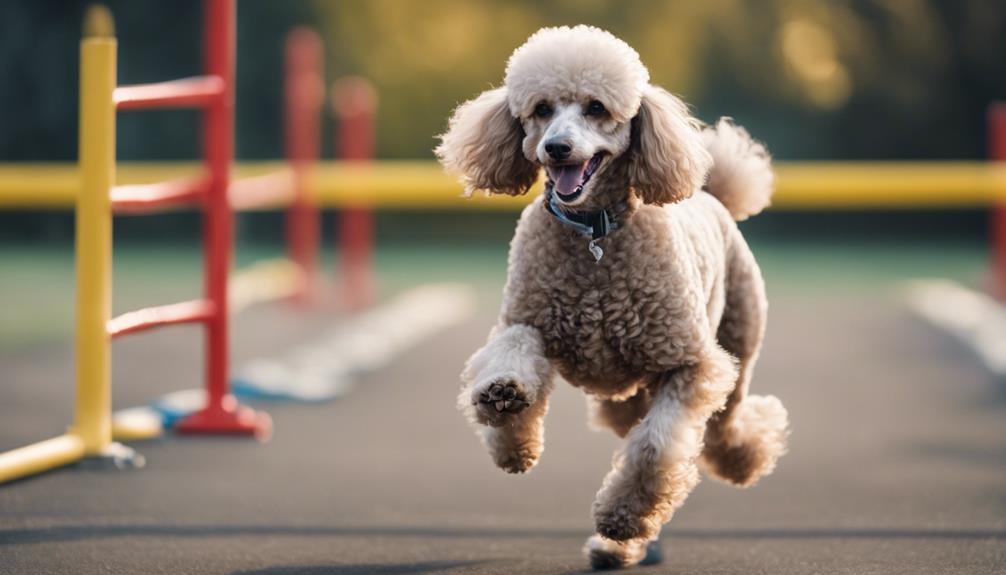
To truly excel in training your Poodle, understanding their behavior is paramount. Poodles, being the second smartest dog breed, exhibit high intelligence and are quick learners. However, this intelligence can sometimes lead to boredom during training sessions if not provided with engaging activities. It is essential to establish a positive environment within your household to successfully train your Poodle. Creating strong foundations in training is key to effectively channeling your Poodle's intelligence and eagerness to learn. Commencing training as early as 6-8 weeks old can help lay the groundwork for a solid training relationship with your Poodle. By recognizing and adapting to your Poodle's behavior, you can tailor your training techniques to suit their individual needs and abilities. Patience, consistency, and positive reinforcement are vital components when working with your Poodle to achieve successful training outcomes. Understanding your Poodle's behavior will enable you to build a strong bond and achieve remarkable results in their training journey.
Importance of Mental Stimulation
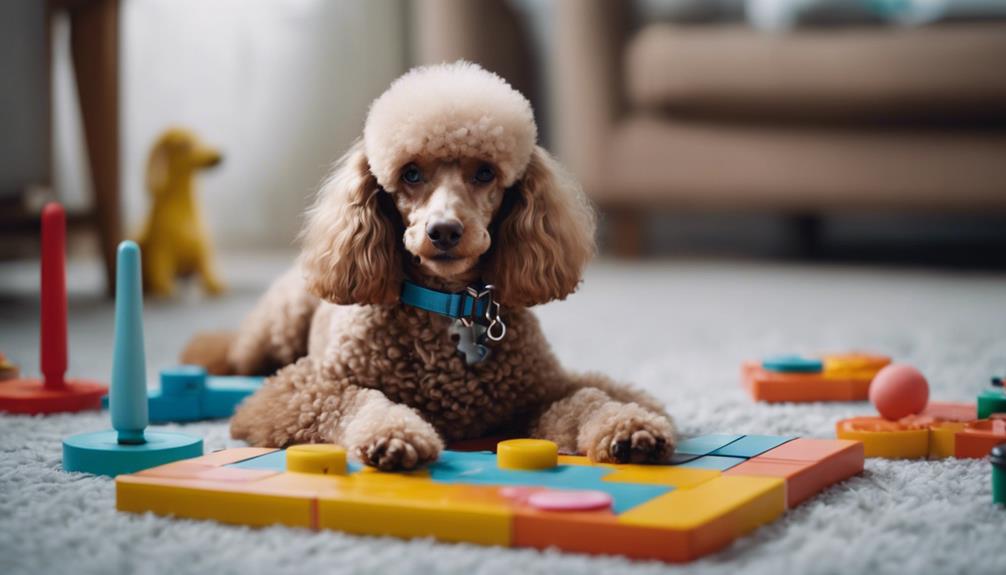
Keeping your Poodle mentally stimulated is vital for their well-being and happiness. Brain games and challenging activities not only prevent boredom but also help sharpen their cognitive abilities. Engaging in scent work, agility training, and obedience exercises will keep your Poodle's mind active and prevent behavioral issues.
Mental Exercise Benefits
Ensuring your Poodle receives adequate mental stimulation is essential for their overall well-being and cognitive development. Mental exercise benefits go beyond just keeping your Poodle entertained; they are crucial for their mental sharpness and happiness. Here are four reasons why mental stimulation is so important for your Poodle:
- Prevent Boredom: Mental challenges help prevent boredom in Poodles, keeping them engaged and active.
- Maintain Intelligence: Engaging in mental exercises enhances problem-solving skills and cognitive development in Poodles.
- Behavioral Issues Prevention: Providing mental stimulation can prevent behavioral issues that may arise due to lack of mental engagement.
- Enhanced Well-being: Interactive toys, puzzles, and training games contribute to your Poodle's overall well-being and happiness.
Brain Games for Poodles
Mental stimulation plays a crucial role in keeping your Poodle engaged and preventing boredom. Brain games are essential for Poodles of all ages, including Poodle puppies. Engaging in interactive toys and puzzles not only provides mental challenges but also enhances problem-solving skills and cognitive abilities in your furry friend. These activities are particularly important during the potty training phase, as they can help reduce behavioral issues caused by lack of mental stimulation. Regularly incorporating brain games into your Poodle's routine can lead to improved overall well-being and happiness by keeping their minds sharp and active. Remember, a stimulated mind is a happy mind for your Poodle!
Harness Training for Poodles
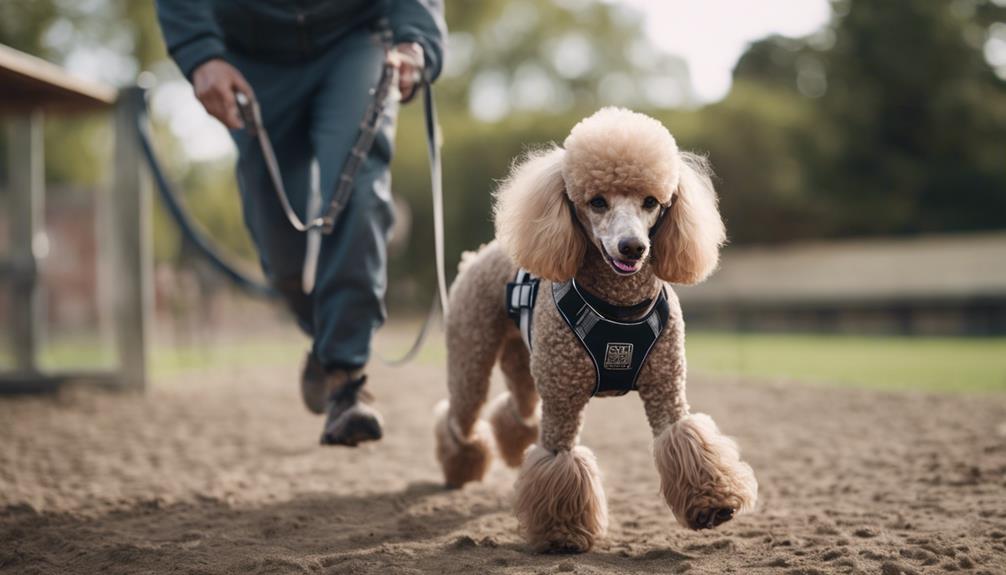
When training your Poodle, consider utilizing a harness to ensure a comfortable and safe walking experience. Harness training offers many benefits for both you and your furry companion. Here are some key points to keep in mind:
- Prevent Pulling: Harness training can help prevent your Poodle from pulling on the leash, making walks more enjoyable for both of you.
- Avoid Neck Injuries: By using a harness, you can protect your Poodle from potential neck injuries that can occur when they pull on a collar.
- Even Pressure Distribution: Harnesses distribute pressure evenly across your Poodle's body, providing better control and reducing the risk of injury.
- Escape Prevention: Properly fitting harnesses can prevent your Poodle from escaping during walks, giving you peace of mind and ensuring their safety.
Harness training is an effective way to teach leash manners and control to your Poodle, making walks a pleasant experience for both of you.
Overcoming Opposition Reflex
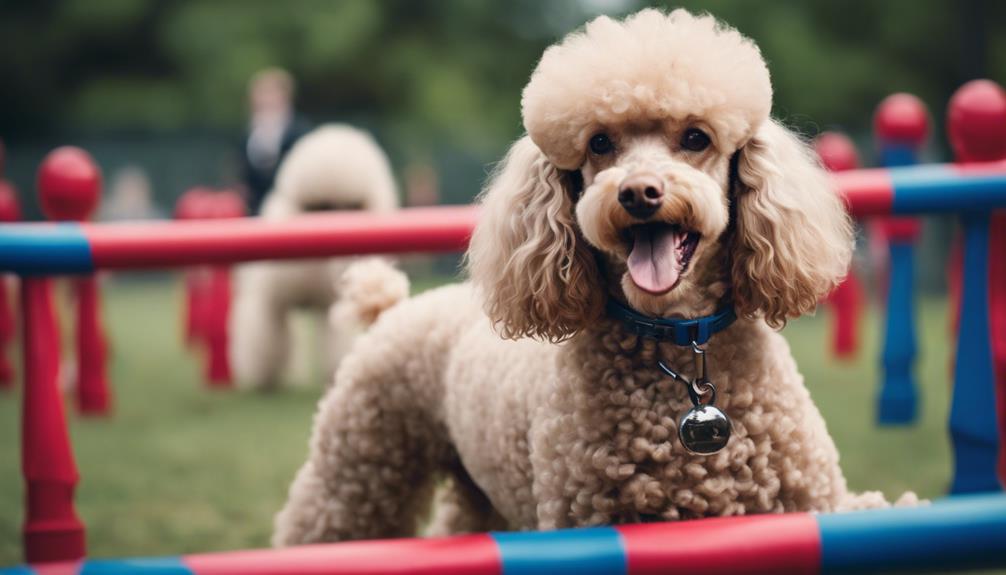
To help your Poodle overcome opposition reflex, start by gently guiding them and reinforcing positive behavior. Opposition reflex is a natural response in dogs to resist leash pressure, but with patience and consistent training, you can help your Poodle learn to yield to it. Begin by desensitizing your Poodle to leash pressure in a calm and controlled environment. Use positive reinforcement, such as treats or praise, to reward your Poodle when they respond well to gentle guidance. As your Poodle becomes more comfortable with leash pressure, gradually introduce distractions and challenges to further reinforce positive behavior.
When training your Poodle to overcome opposition reflex, remember that bathroom breaks are important. Allow your Poodle regular breaks during training sessions to prevent frustration and maintain focus. By combining positive reinforcement with consistent training and understanding, you can help your Poodle successfully overcome opposition reflex and become a well-behaved companion.
Advanced Obedience Commands
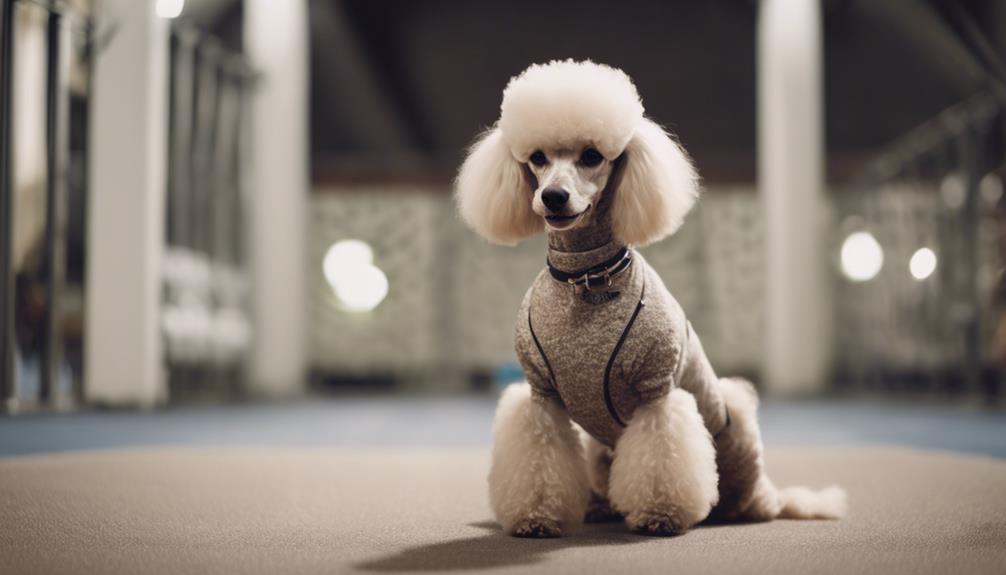
To further advance your Poodle's training, incorporating advanced obedience commands such as 'heel,' 'leave it,' and 'go to your mat' can substantially expand their skill set and strengthen your bond. Here are some tips to help you effectively teach these commands to your intelligent Poodle:
- Patience and Consistency: Advanced obedience commands require patience, consistency, and positive reinforcement. Ensure you are calm and consistent in your training approach to help your Poodle learn effectively.
- Increase Difficulty Gradually: Gradually increase the difficulty level of commands to challenge your Poodle's mental abilities and focus. This gradual progression can help them master each command successfully.
- Practice and Repetition: Consistent practice and repetition are key to mastering advanced obedience commands. Regular training sessions will help reinforce learning and improve your Poodle's responsiveness.
- Bonding Through Training: Advanced obedience training not only improves obedience but also strengthens the bond between you and your Poodle. Enjoy the training process together to enhance your relationship while teaching new commands.
Enhancing Focus and Attention

Enhancing focus and attention in your Poodle can be achieved through strategic training methods and consistent practice. When training your Poodle puppy, it's crucial to pay special attention to your puppy's needs and abilities to maximize their focus during training sessions. Here are some key techniques to help enhance your Poodle's attention:
| Techniques | Description |
|---|---|
| Use high-value treats | Reward your Poodle with treats they love to maintain focus and motivation. |
| Incorporate short training sessions | Prevent boredom by keeping sessions engaging and brief to hold their attention. |
| Practice in different environments | Generalize focus by training in various locations to improve adaptability. |
| Implement clicker training | Use a clicker to mark desired behaviors effectively and enhance focus. |
Agility Training for Poodles
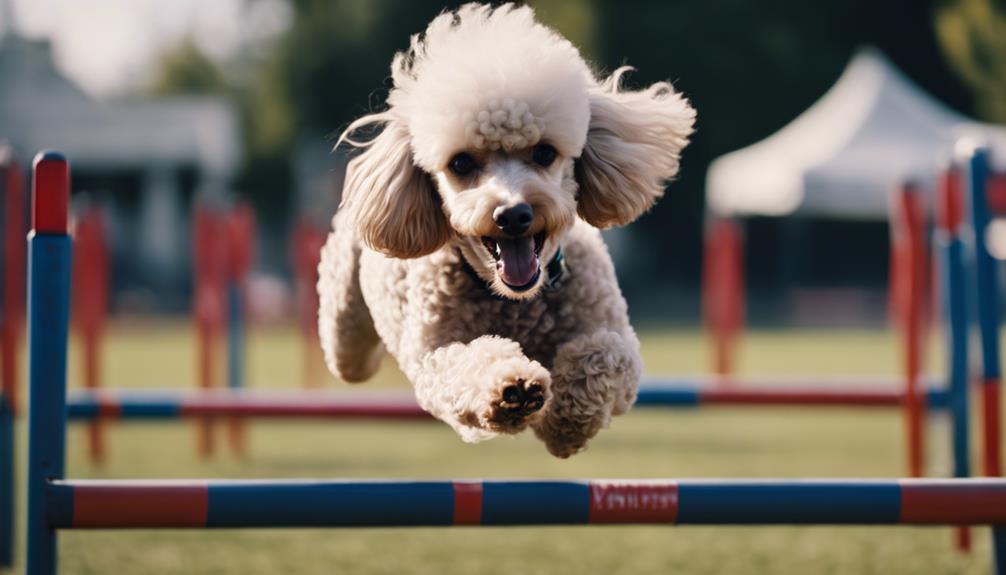
Are you ready to amp up your Poodle's training regimen with agility exercises? Speed and agility are key components of agility training that can help your Poodle stay fit and mentally sharp. Obstacle course training, including tunnels, weave poles, and jumps, will provide a fun and stimulating challenge for both you and your Poodle.
Speed and Agility
Improving your Poodle's speed and agility through agility training can enhance their physical abilities and mental sharpness. Here's how you can help your furry friend excel in agility:
- Consistent Practice: Regular training sessions are key to improving speed and agility.
- Varied Obstacles: Introduce a variety of obstacles like tunnels, weave poles, and jumps to challenge your Poodle.
- Positive Reinforcement: Use treats and praise to motivate and reward your Poodle during training.
- Focus on Technique: Work on teaching your Poodle efficient navigation of agility courses to boost their performance.
Obstacle Course Training
To boost your Poodle's agility and coordination, engage them in obstacle course training, a dynamic and enjoyable way to enhance their physical and mental capabilities. Poodles, known for their intelligence and athleticism, thrive in agility training. Agility courses typically include jumps, tunnels, weave poles, and various obstacles that challenge your Poodle's abilities. During training sessions, focus on positive reinforcement to build confidence in navigating the course. This form of training not only keeps your Poodle physically fit but also mentally stimulated, fostering a stronger bond between you and your furry companion.
| Key Points | Description |
|---|---|
| Fun and Engaging | Obstacle courses make training enjoyable for both you and your Poodle. |
| Mental Stimulation | Challenges in the course enhance your Poodle's cognitive abilities. |
| Physical Fitness | Agility training helps your Poodle stay in shape and maintain good health. |
| Bond Strengthening | Completing obstacles together strengthens the bond between you and your Poodle. |
Socialization Techniques
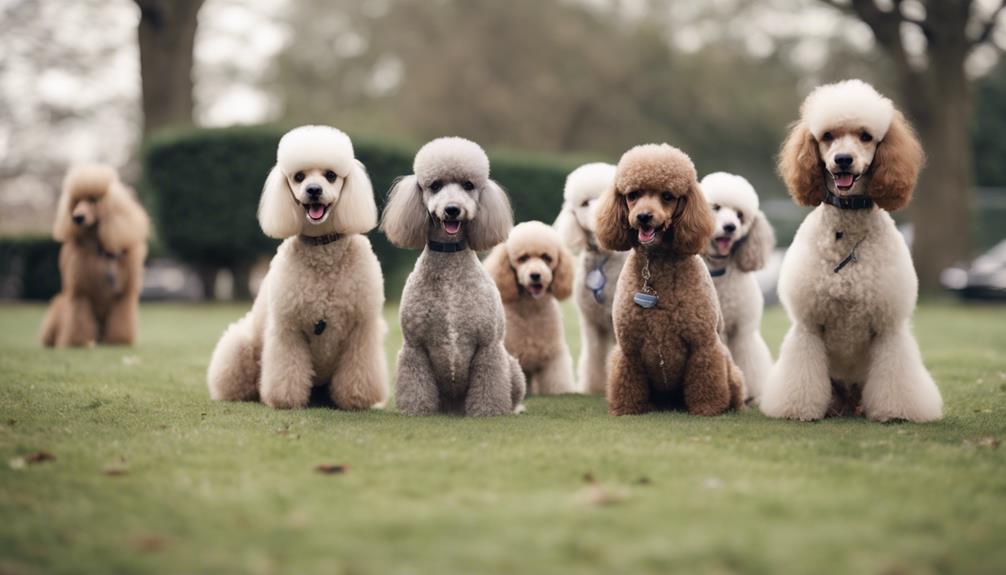
For effective socialization of your Poodle, prioritize exposing them to various environments, sounds, and stimuli to foster positive behavior and confidence. Here are some practical tips to help you socialize your Poodle effectively:
- Start Early: Begin socializing your Poodle as soon as they have completed their initial vaccinations, typically around 8 weeks old. The critical socialization period is between 8 to 16 weeks when your puppy can hold short interactions well.
- Set a Schedule: Establish a regular socialization routine for your Poodle. Plan outings to different places, such as parks, streets, or pet-friendly stores, to introduce them to various sights, sounds, and smells.
- Positive Reinforcement: Encourage good behavior during social interactions by rewarding your Poodle with treats, praise, or playtime. Positive experiences will help build their confidence and trust in new situations.
- Gradual Exposure: Introduce your Poodle to different people, dogs, and environments gradually. Monitor their reactions and comfort levels, and adjust the pace of socialization accordingly to ensure they feel safe and secure.
Advanced Poodle Grooming Tips
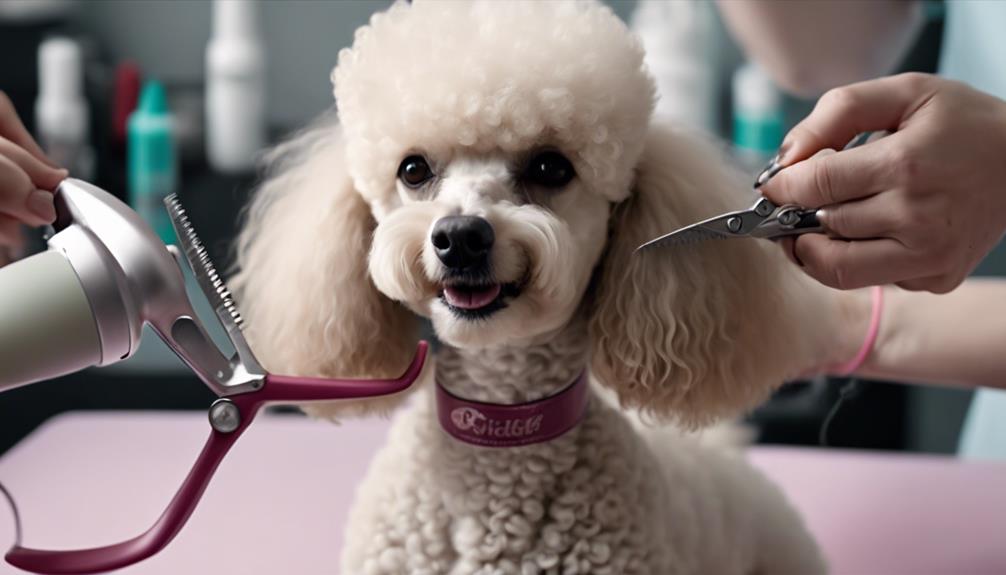
When it comes to advanced grooming for your poodle, mastering coat care essentials is key to achieving that show-stopping look. You'll need to dive into styling techniques specifically tailored for poodles, from intricate patterns to precise trims. Equipping yourself with the right tools, such as thinning shears and clipper attachments, will make all the difference in your grooming endeavors.
Coat Care Essentials
Keeping your Poodle's coat in top condition requires regular brushing and combing to prevent matting and maintain its unique texture. Here are some essential tips for advanced Poodle grooming:
- Schedule professional grooming every 4-6 weeks to ensure the coat stays healthy and well-maintained.
- Invest in high-quality grooming tools like slicker brushes and stainless steel combs for effective grooming sessions.
- Trim the fur around your Poodle's eyes, ears, and paws regularly to avoid irritation and maintain cleanliness.
- Use dog-specific shampoos during baths to keep the coat clean and healthy. Remember, proper coat care not only enhances your Poodle's appearance but also contributes to their overall well-being.
Styling Techniques for Poodles
To elevate your Poodle's grooming routine to the next level, consider exploring advanced styling techniques that showcase their unique coat texture and elegance. As part of the training process, start with small steps towards mastering intricate patterns like the Continental or English Saddle cuts. Professional groomers often rely on specialized tools such as thinning shears and clipper attachments for precise styling. Incorporating scissoring, shaping, and blending techniques during grooming sessions will help you achieve a polished and elegant look for your Poodle. By taking gradual steps and practicing regularly, you can enhance your Poodle's appearance while maintaining their coat health.
| Advanced Styling Techniques for Poodles |
|---|
| 1. Start with small steps towards intricate patterns like the Continental or English Saddle cuts. |
| 2. Utilize specialized grooming tools such as thinning shears and clipper attachments for precise styling. |
| 3. Practice scissoring, shaping, and blending techniques to achieve a polished look. |
| 4. Regular grooming sessions are essential for maintaining coat health and preventing matting. |
Tools for Grooming
Invest in high-quality grooming tools specifically designed for your Poodle's unique coat, such as slicker brushes and metal combs. When selecting grooming tools, opt for those with rounded tips to prevent skin irritation and discomfort during grooming sessions. Remember to regularly clean and maintain your grooming tools to keep them effective and hygienic for your Poodle's grooming needs. Additionally, consider specialized tools like dematting combs and detangling sprays to manage tangles and mats in your Poodle's coat. By educating yourself on proper grooming techniques and utilizing the right tools, you can ensure your Poodle's coat remains healthy, shiny, and free from tangles.
Problem-Solving Training Strategies
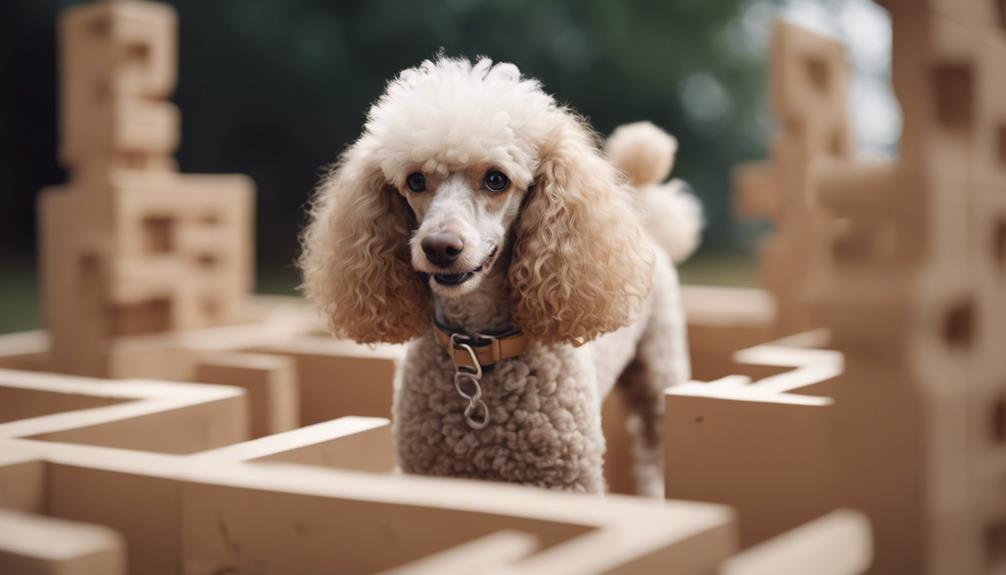
When addressing problem-solving training strategies for your Poodle, it's essential to first identify specific behavior challenges to effectively tailor your approach. Utilize positive reinforcement techniques, such as rewarding good behavior with treats or praise, to address and modify challenging behaviors. Crate training can also be a valuable tool in solving problems like separation anxiety or destructive behavior. Consistency is key; establish a routine to overcome behavior obstacles and reinforce desired behaviors. If you encounter complex behavior issues beyond your expertise, seek professional guidance or consider specialized training programs. Remember to adapt your problem-solving strategies to your Poodle's individual needs and personality for the most successful training outcomes. By combining patience, understanding, and a proactive approach, you can effectively tackle behavior challenges and strengthen the bond with your furry companion.
Canine Enrichment Activities
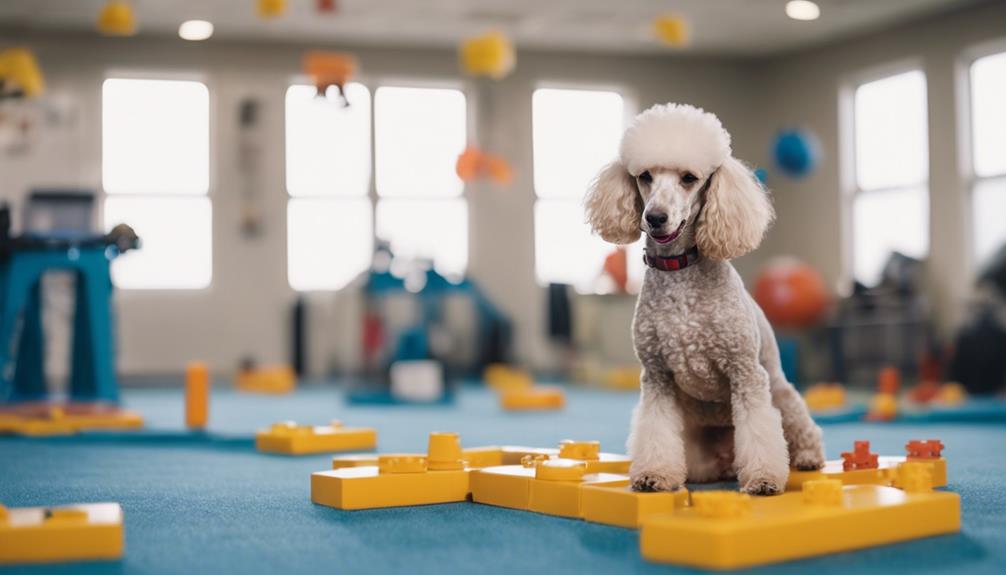
Engaging in stimulating games and creating DIY puzzle toys can provide your Poodle with mental challenges that keep them sharp and entertained. Regularly incorporating these activities into your training routine not only prevents boredom but also enhances problem-solving skills. By offering a variety of enrichment opportunities, you can ensure your Poodle's overall well-being and happiness.
Stimulating Games for Poodles
To keep your Poodle mentally stimulated and prevent boredom, engaging in stimulating games and activities is essential. Here are some stimulating games for your Poodle:
- Puzzle Toys and Interactive Games: These are great for mental stimulation and can keep your Poodle entertained for hours.
- Hide and Seek: Engage your Poodle's natural hunting instincts by playing hide and seek games indoors or outdoors.
- Nose Work Activities: Provide mental challenges and sensory stimulation by teaching your Poodle to use their nose to find hidden treats or toys.
- Tricks and Agility Exercises: Keep your Poodle mentally sharp and physically active by teaching them new tricks and engaging in agility exercises.
DIY Puzzle Toys
To enhance your Poodle's mental agility and promote interactive play, crafting DIY puzzle toys can be a rewarding and engaging activity. Puzzle toys provide mental stimulation, preventing boredom, reducing destructive behavior, and improving problem-solving skills. They are cost-effective and customizable to your Poodle's preferences and abilities. Using household items like cardboard boxes, plastic bottles, and treats, you can create stimulating challenges for your pet. Engaging your Poodle with these toys not only offers entertainment but also strengthens the bond between you and your furry companion. Enjoy the process of making these puzzle toys and witnessing your Poodle's excitement and intelligence as they tackle the challenges you've crafted for them.
Advanced Trick Training
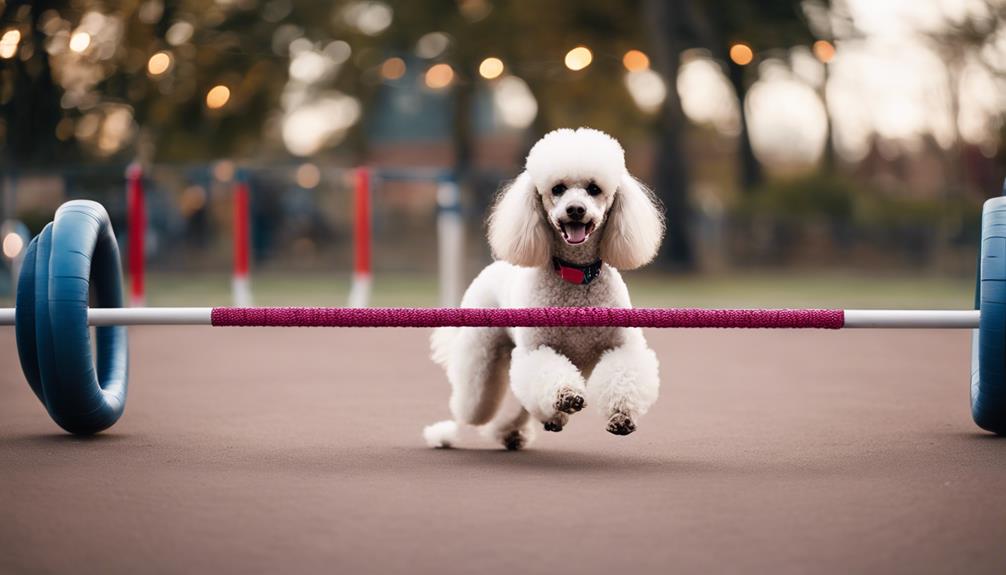
For successful advanced trick training with your Poodle, consistent practice, patience, and positive reinforcement are essential. Poodles, known as the smartest dog breed, thrive on mental challenges and tasks that keep them engaged. When teaching advanced tricks to your Poodle, consider the following tips:
- Break It Down: Complex tricks like weaving through legs can be daunting. Break them into smaller steps for easier learning.
- Use High-Value Treats: Reward your Poodle generously with treats they love when they successfully perform advanced tricks to reinforce good behavior.
- Stay Calm and Positive: Poodles are sensitive to their owner's emotions. Stay calm and positive during training sessions to create a supportive environment.
- Practice Regularly: Consistent practice is key to mastering advanced tricks. Short, frequent training sessions are more effective than long, sporadic ones.
Building Confidence in Poodles
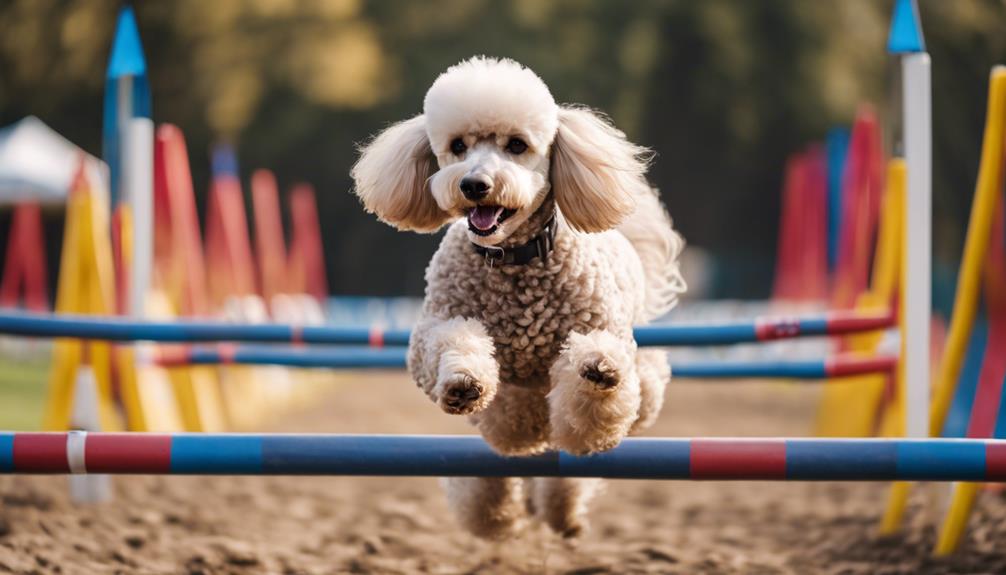
Building confidence in your Poodle requires consistent positive reinforcement and tailored training methods to help them flourish in various situations. Gradually expose your Poodle to new environments and experiences, ensuring they feel safe and secure. Pay attention to your puppy's cues; if they seem anxious, take a step back and provide reassurance before trying again. Encouraging your Poodle to overcome challenges, such as leaving the crate door open for them to explore voluntarily, can boost their self-assurance. Praise their progress enthusiastically to reinforce their confidence.
Incorporate mental stimulation and engaging activities into your Poodle's routine to keep their mind sharp and build confidence through accomplishments. By building a strong bond based on trust and clear communication, you can help your Poodle feel more secure and self-assured in their abilities. Remember, each Poodle is unique, so adjust your training approach to suit your furry friend's personality and comfort level.
Fitness and Exercise Regimen
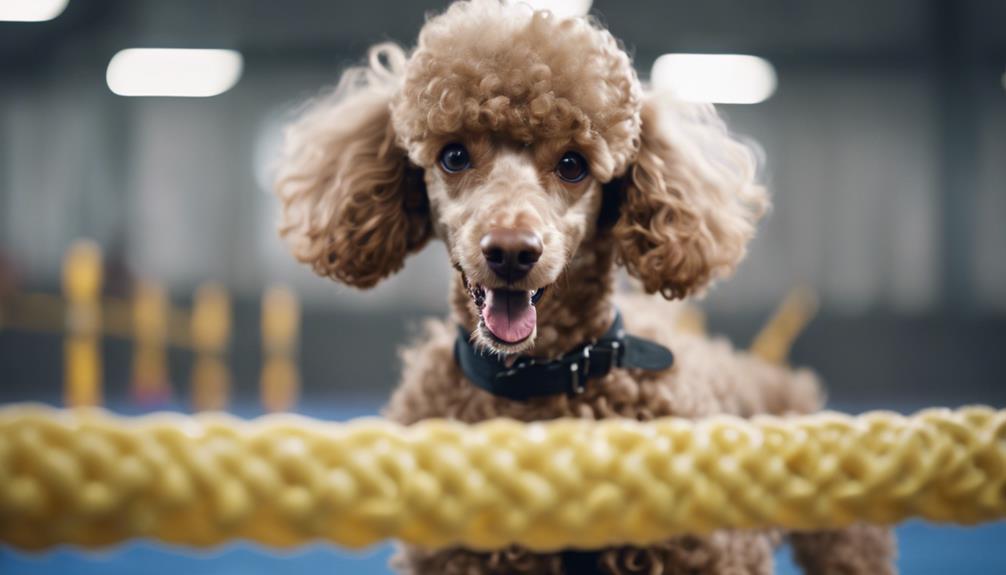
Enhancing your Poodle's fitness level through a structured exercise regimen is essential for their overall well-being and behavior management. Regular physical activity not only keeps your Poodle physically healthy but also provides crucial mental stimulation that is vital for their overall happiness. Here are some key points to consider when designing an exercise routine for your Poodle:
- Tailor the Routine: Customize the exercise regimen to suit your Poodle's age, size, and energy level. This personalized approach ensures that the activities are both enjoyable and beneficial for your furry friend.
- Incorporate Variety: Include a mix of activities like agility training, swimming, and interactive play to keep your Poodle engaged and mentally stimulated. Variety prevents boredom and helps in maintaining enthusiasm for exercise.
- Consistency is Key: Regular and consistent exercise not only helps manage weight but also promotes your Poodle's overall well-being. Establishing a routine and sticking to it is essential for long-term health benefits.
- Observe and Adapt: Pay attention to your Poodle's response to different activities and adjust the exercise routine as needed. Being attentive allows you to make necessary changes for a successful fitness program.
Frequently Asked Questions
What Tricks Can Poodles Do?
Poodles can do a variety of tricks like agility courses and obedience tasks. They excel in poodle agility and obedience due to their intelligence and eagerness to please. With practice, they can master impressive routines.
What Are Some Advanced Dog Tricks?
To master advanced obedience and canine agility, focus on consistency and positive reinforcement. Your Poodle can excel in weaving through poles, balancing items, and retrieving by name. Enhance mental stimulation, build confidence, and strengthen your bond.
Why Is My Poodle so Hard to Train?
You find your poodle hard to train because understanding their motivation can be tricky. Behavior modification techniques, combined with patience and consistency, help. It's all part of the journey to building a strong bond with your furry friend.
How Do You Train a Bad Poodle?
When training a bad poodle, focus on behavior modification using positive reinforcement. Consistency is key in addressing issues like leash aggression and separation anxiety. Seek professional guidance if needed. Remember, patience and understanding go a long way.
Conclusion
Now that you've learned about advanced training techniques for Poodles, remember that mental stimulation is key to keeping your intelligent pup engaged. Did you know that Poodles are ranked as the second most intelligent dog breed? By incorporating challenging exercises and activities into your training routine, you can help prevent boredom and maintain a happy, well-behaved companion. Keep up the good work and enjoy the journey of training your Poodle to be their best selves!
